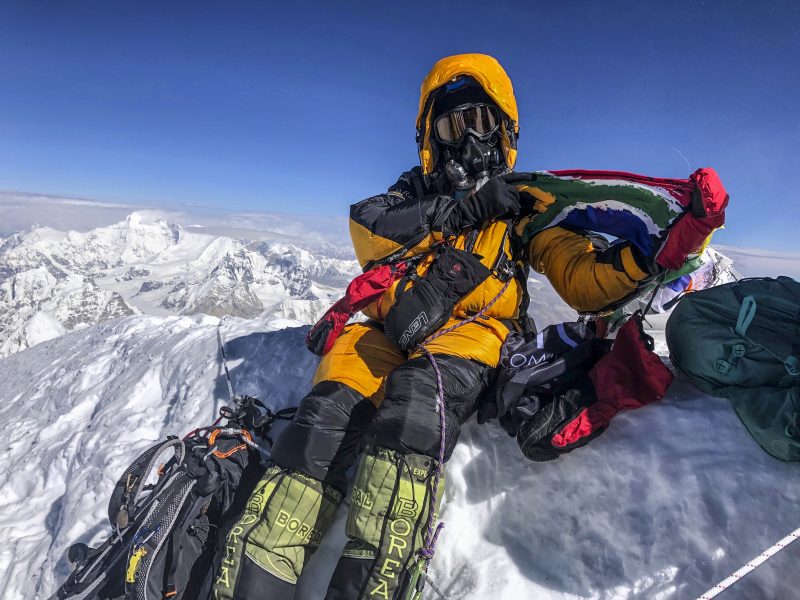Black Africans must pick up Everest challenge, says landmark climber
Saray Khumalo poses with a South African flag on May 16, 2019, after becoming the first black African woman to climb Mount Everest (Handout)
Kathmandu (AFP) – The first black African woman to climb Everest said Thursday that people from her continent must seek “amazing” new challenges to prove they can compete with the best.
“There are many places still, unfortunately if you think about it, that we still haven’t broken through,” Saray Khumalo told AFP in an interview after conquering the world’s highest peak.
The 47-year-old South African business executive reached the summit of the 8,848-metre (29,029-foot) mountain last week after three previous bids failed.
Although she had not thought about being the first when she reached the top, she now knows “how big a deal it is” for black African women.
“So it is such an honour and a privilege to be the one to actually do it,” said Khumalo, the skin on her face still chapped by Everest’s harsh conditions.
“If you think about it, Everest was first climbed in 1953. It’s taken us how many flipping years for us to be there?
“What an honour in a small way to be that vehicle that says ‘you know let’s level the playing field, let’s have a seat at the table, we can also do this’,” she added.
– Why me? –
“Now it is up to us to take it to the next level and I’m hoping someone picks up the baton and does something amazing.”
Khumalo, who is trying to conquer the highest summits on each of the seven continents, said she took up climbing after someone asked her about Mount Kilimanjaro while on a visit to the United States.
That motivated her to try Africa’s highest peak, in Tanzania, and Khumalo has not stopped since — even though she was forced back from three previous attempts on Everest through illness or bad weather.
“What has worked in my favour is the learning I have taken from every summit, every interaction with the sherpas and the climbers, and every experience that I’ve had,” she said.
“It’s just confirmed that giving up is never an option because the summit could be just the next step,” she said.
Her first attempt in 2014 was halted when an avalanche killed 16 guides on the slope.
“I was shaken. I was very naive as a climber,” she said.
“Knowing what I know today, I shouldn’t have been on the mountain,” she added.
“You sit there and start questioning, some of those people that died had had 15 years experience. Why them and not me who is just here for the first time?
“You realise it is not your time, so you still have stuff to do which is why I came back.”
A devastating earthquake cancelled her expedition in 2015, while last year strong winds and frostbite forced her to turn back.
“That made me a lot more cautious this year, it made me realise I can’t take anything for granted. It doesn’t matter how close I am until I get back to base camp.”
This year, an Irish professor on her expedition died on Everest.
“When I got to Camp 2 and it was the first time I cried. Somebody said ‘congratulations’ and I didn’t know how to react. Maybe it wasn’t his time, but even knowing that and knowing the risks of the mountain doesn’t make it easy,” she said.
Khumalo, one of seven sisters, said she had made a success of her life because her mother had invested in her education.
“I decided that I am going to climb the seven summits around the world and I’m going to use the climbing to make a difference: build libraries, take children to school.”
Everest was fourth on her list after Mount Kilimanjaro, Aconcagua in Argentina and Mount Elbrus in Russia.
Disclaimer: Validity of the above story is for 7 Days from original date of publishing. Source: AFP.


